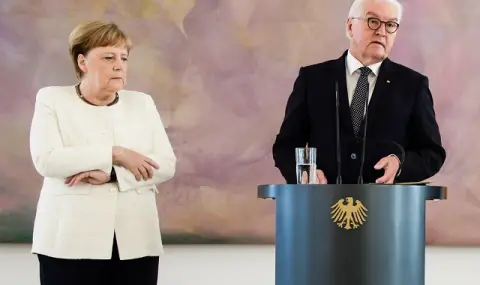In the US, information about the president's health is public. Recently, Americans learned, for example, that Donald Trump is in excellent shape. In Germany, this kind of data is kept secret. Why is this so?
US President Donald Trump is in "excellent mental and physical health" and is "fully fit to perform the duties of commander in chief and head of state", says a report by White House physician and former US Navy captain Sean Barbabella.
It also provides data on Donald Trump's exact height, weight, blood pressure and resting pulse. Anyone interested in the subject can read about the medical tests the president underwent during his routine medical check-up, what medications he takes to control his cholesterol, and that he had his appendix removed at the age of 11. The document also reveals that Trump passed a cognitive ability test with a perfect score. It is also said that his excellent condition is due to his "active lifestyle", and it is also mentioned that Trump has won many golf tournaments.
You will hardly find such information about the outgoing German Chancellor Olaf Scholz, and not only because it is not known whether he plays golf. The German public generally knows almost nothing about the health of its head of government.
No data on the health of the German Chancellor
DW sent a request to the government press service requesting information about which doctor is treating the chancellor, why so little is known about his health, and where previous heads of government have been treated.
"Please understand, but in principle we do not comment on the health of the chancellor and his medical care. What we do know is that the German chancellor does not have a personal doctor. Unless there is a specific health problem, the head of government does not bring doctors with him on business trips or state visits. There is no permanent doctor in the chancellery in Berlin, and if he needs one, the famous "Charité" hospital "is a five-minute drive away," the reply read.
Why doesn't the chancellor have a personal doctor?
Olaf Scholz probably doesn't have to wait in a crowded waiting room. And Angela Merkel probably hasn't had to wait to see a specialist during her 16-year term. Still, some might wonder why the head of government of Europe's largest economy doesn't have a personal doctor available.
One reason may be confidence in Germany's robust public health system. Another explanation for the vast difference between American and German political leaders can be explained by the different power they wield. The German chancellor's power is nowhere near that of an American president, says German ophthalmologist Ronald D. Gerste, who lives in Washington, D.C., told the medical news portal Coliquio: "Political processes in Germany would not be significantly affected if the chancellor fell ill, because Germany is not a presidential democracy - the cabinet would continue to meet and make decisions."
"That's why Germany is so discreet when it comes to the health of its leaders."This, of course, does not mean that chancellors do not get sick. It's just that this information is not always made public in Germany.
Depression and seizures
Willy Brandt, chancellor from 1969 to 1974, was said to suffer from depression. This may explain why he regularly withdrew from political life for several days. Shortly before his resignation, a statement was published that Brandt had "a cold with a fever". Years later, he himself admitted that he had actually been extremely exhausted.
His successor, Helmut Schmidt, says he blacked out "about 100 times" while in office from 1974 to 1982. Schmidt suffered from Adams-Stokes syndrome, which is characterized by periodic seizures resulting from a complete cardiac arrest. "I would lose consciousness for a few seconds, sometimes minutes," Schmidt says. "We managed to keep it a secret, so it didn't stop me from doing my job," he says.
Merkel's hands
In the summer of 2019, former Chancellor Angela Merkel was seen shaking in public several times, prompting unusual press questions about her health. At the time, dehydration while traveling was officially cited as the cause. Only after leaving office did Merkel admit that high temperatures and dehydration were not the only cause.
"My mother's death affected me very much", she revealed in an interview in 2022. Angela Merkel and her mother were very close before the elderly woman's death in April 2019. Two months later, the public first noticed signs of tremors in the chancellor.
